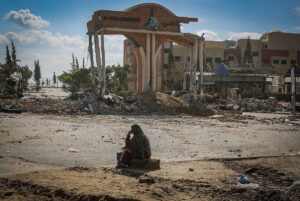The decimation of Gaza’s academia is ‘impossible to quantify’

A Palestinian woman sits in front of the damaged entrance to Al-Aqsa University in Khan Younis, southern Gaza Strip, 26 January 2024
Ibtisam Mahdi writes in +972 on 26 July 2024:
Dr. Refaat Alareer was a good friend of mine. A poet, writer, and prominent activist for the Palestinian cause, Refaat taught English literature and poetry for many years at the Islamic University of Gaza. He loved the works of Shakespeare, Thomas White, John Donne, Wilfred Owen, and many others, and he was the editor of two books: “Gaza Unsilenced“ and “Gaza Writes Back.”
Refaat is one of at least 105 Palestinian academics killed in Gaza since the start of Israel’s war, according to the Palestinian Education Ministry’s latest statistics. His home institution, the Islamic University, has been completely demolished by the bombing campaign — and all of Gaza’s 19 universities have sustained severe damage or lie in utter ruins, with over 80 percent of university buildings destroyed. The Strip’s nearly 90,000 students who were enrolled in institutions of higher learning before the war have largely been unable to continue their studies.
The annihilation of higher education is particularly tragic for Gaza’s future: this source of learning, economic growth, livelihoods, and community is now gone. But the stories of the teachers and schools we have lost, and the educational opportunities that are now foreclosed, deserve to be told.
Refaat understood the importance of education better than most. He encouraged me to learn English for my work as a journalist, and he loved teaching me new words in both English and Arabic. “Through storytelling,” he would remind me, “we affirm our right to this land. And learning the English language is a means of breaking free from the prolonged siege of Gaza.”
**** **** ****
Refaat’s cousin, Muhammad Alareer, said that he believes the Israeli army targeted Refaat precisely because of his scholarship and fluency in English — as well as his work with the “We Are Not Numbers” project, a Palestinian non-profit that Refaat co-founded in 2015. “Before the attack,” Muhammad told +972, “he received many death threats online and via mobile phone from Israeli accounts, demanding him to stop writing and publishing.”
